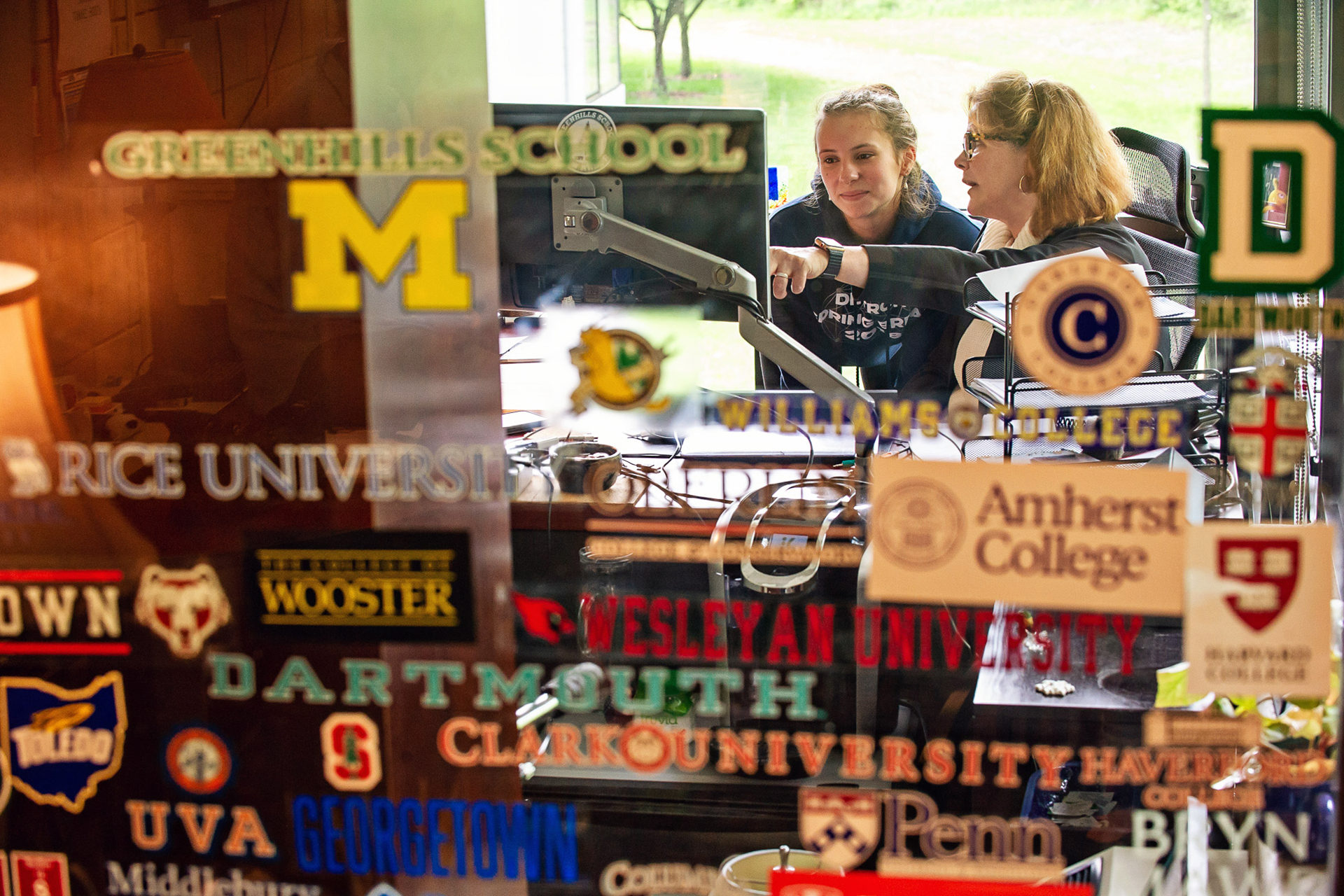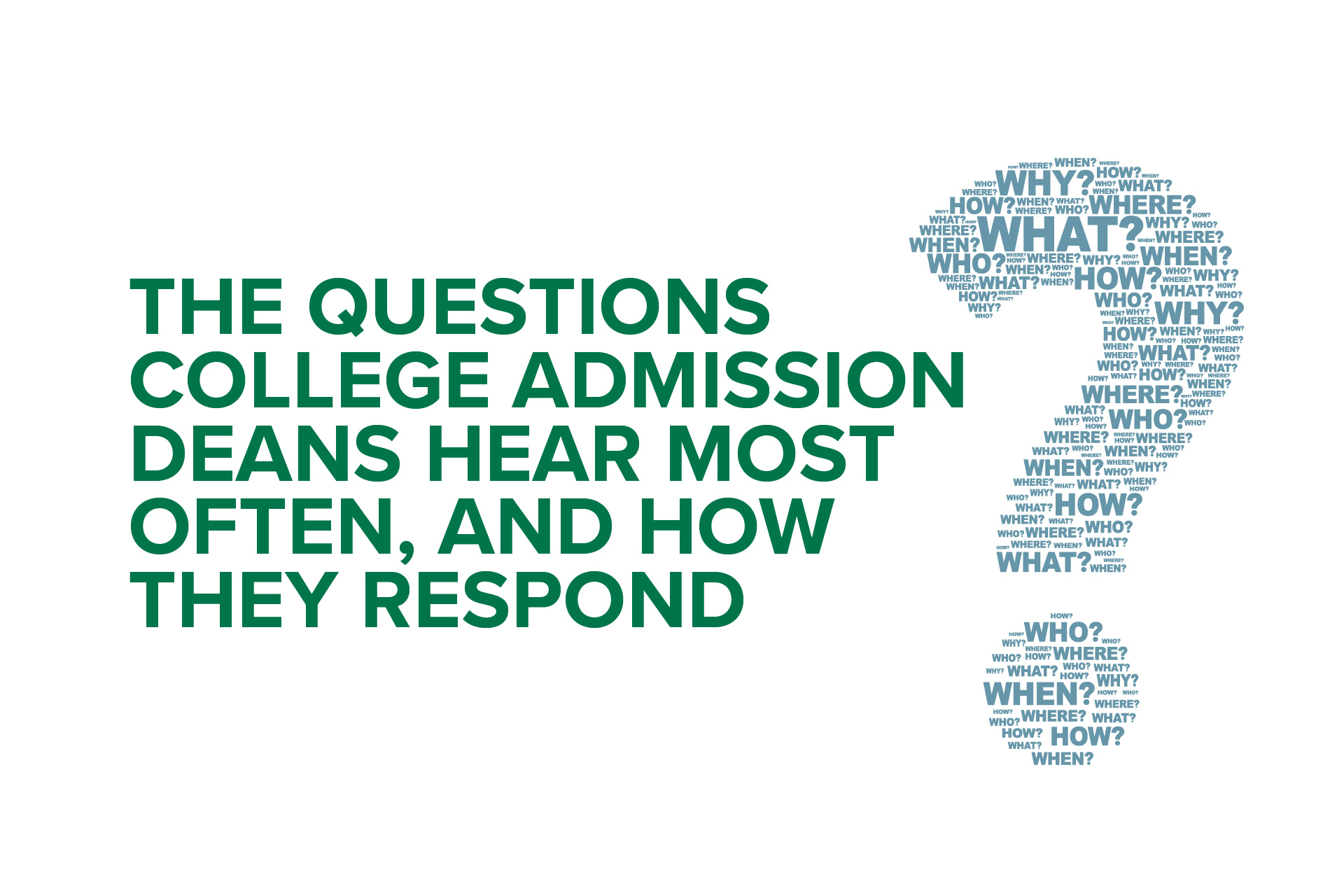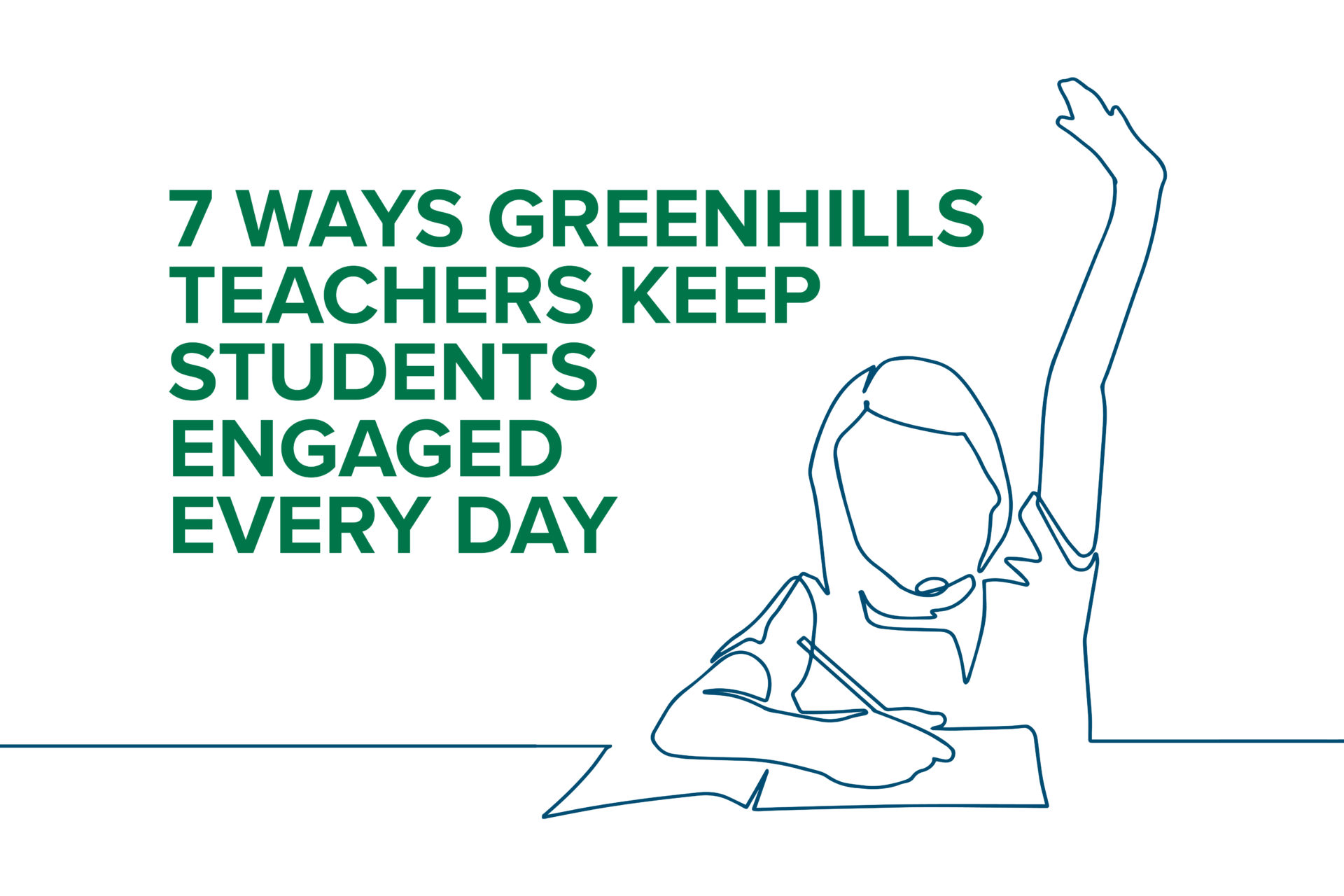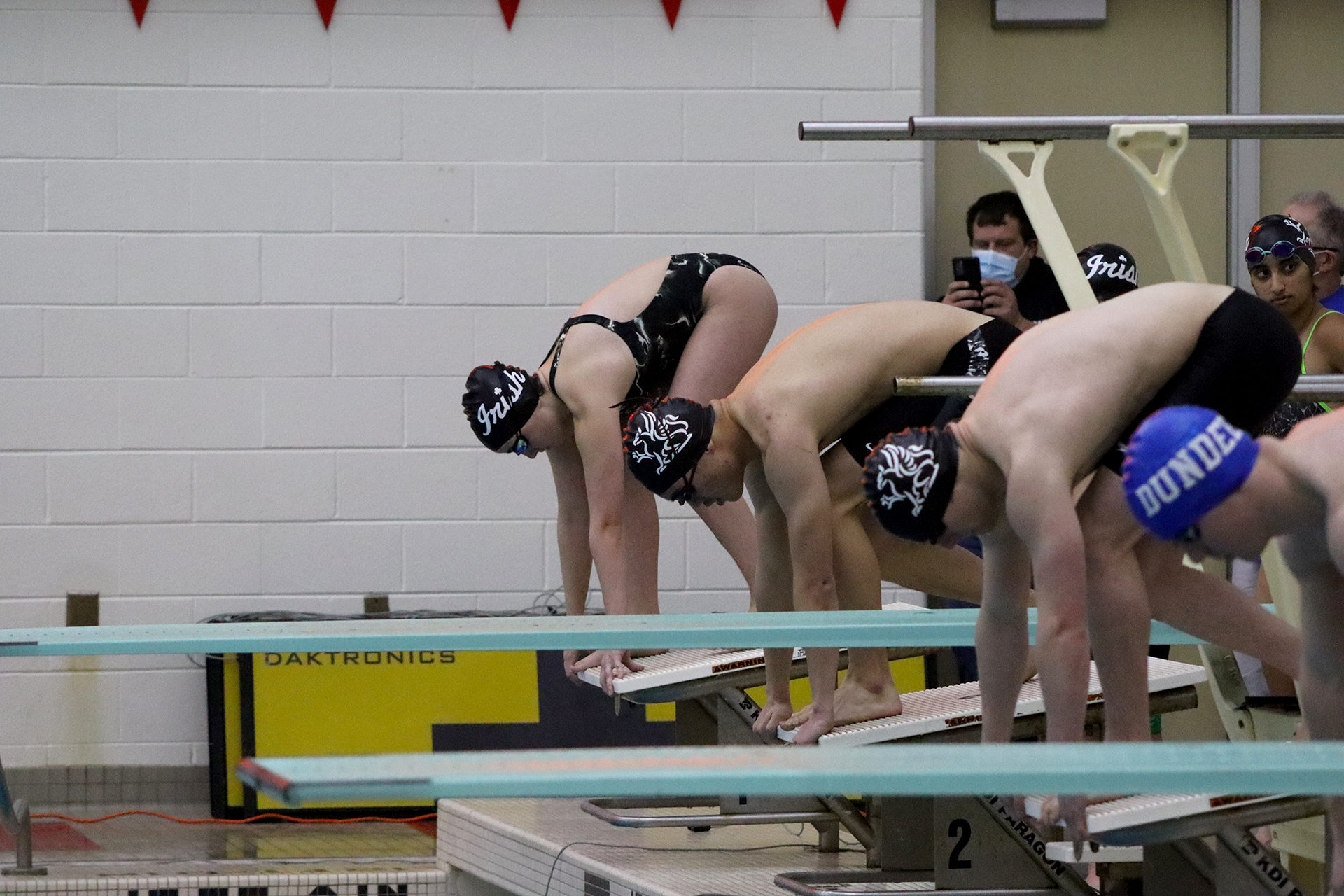The Best Advice College Counselors Wish Students Would Take to Heart

These days, you can’t take more than a few steps without running into advice on how to get into a “good” college. Unfortunately, when it doesn’t come from experienced and trusted sources, that advice is often contradictory, or just plain wrong. Which tests should I take? When? Where should I apply? When? And the question that can loom for months on-end: what in the world should I write about in my essay?
One of the best sources of answers and information are the folks who work in college counseling offices. While most high schools have student counselors, responsible for general guidance and support, schools like Greenhills typically have dedicated college counselors whose lives revolve around helping students identify and gain acceptance into the right school. Sometimes these offices are made up of people who’ve worked in college admission offices and been on the receiving end of those applications, so they bring a lot of credibility to the table.
Yet, despite the expertise of college counselors, some of their best advice is often ignored. We sat down with some of the college counselors at Greenhills to learn about the advice they give out and, especially, the advice they really wish students would follow. Here’s their short list.
Don’t start testing too early
There’s no avoiding the fact that testing is a big deal and takes a lot of preparation. But Greenhills Director of College Counseling Betsy Ellsworth, who also spent a decade at Reed College as Senior Associate Dean of Admission, says that starting too early can cause its own problems.
“We wish students would listen to us when we say that there is such a thing as testing fatigue,” she said. “Our philosophy is, no, do not start test prep in ninth grade.”
According to Ellsworth, in ninth and tenth grade, students are developing their reading, writing, math, and critical thinking skills through their class work. Their brains are constantly developing. As this happens, they’re already doing “test prep.”
“Even if you’re a math whiz, it doesn’t do you any good to be doing test prep and sitting for tests in ninth grade,” Ellsworth said. “Some schools don’t even accept tests taken before 11th grade. Carnegie Mellon, for instance, frowns on the practice.”
At Greenhills, students take the PSAT in 10th grade, then the school offers a free ACT practice test over the winter. After those tests, students meet with their college counselors to determine which test is likely to be the best fit. Ideally, students will start their test prep the summer before their junior year, and if all goes well, they’ll be done with standardized testing by the time senior year rolls around.
Start thinking about financial plans as early as possible
While ninth grade is certainly too early to start preparing for tests, Ellsworth said it’s never too early to start planning out how to pay for college. There are all sorts of elements to consider: the “sticker price,” financial aid offered by colleges themselves, federal loans and grants, different kinds of loans and grants, merit-based versus need-based aid, and all sorts of other details. If you’ve never heard of FAFSA or FERPA, get ready: you will.
Ellsworth recommends a resource called College Scorecard, a Department of Education website. “It’s one of the best resources out there on how to pay for college,” she said. College Scorecard lists schools’ graduation rates, fields of study, average graduate salaries, average tuition broken down by family income, and average monthly loan repayment, among many other pieces of data.
“Finding the right financial fit is just as important as finding the right academic and social fit,” Ellsworth said. “If you’re choosing between two schools, take a look at what the actual cost of each school is going to be.”
Schools often host workshops and speaker events to help students with the college admission process, and families should take advantage of those. At Greenhills, the college counseling office is considering putting on a series of workshops for ninth-grade parents about the cost of college and how to plan for it. Last year, Ron Lieber, author of “The Price You Pay for College: An Entirely New Road Map for the Biggest Financial Decision Your Family Will Ever Make,” spoke at Greenhills, and he will return in the Spring of 2022.
Build relationships with faculty early on
The relationships that students build with teachers and advisors, Ellsworth said, become essential to the college process. Those relationships should start as soon as students enter high school.
“That’s something that should be beginning in ninth grade,” she said. “Be high-school kids. Create relationships, get to know people, find clubs and organizations that you’re interested in joining.”
By 10th grade, students are ready to start thinking about what kind of school is right for them. That’s where relationships with teachers and advisors come in. It’s easy to say “I want a big school,” but it’s a lot more helpful to be able to get input on the college experience from trusted adults who have lived it. Ask an advisor or a teacher: what was your school like? Do you think a school like that would be a fit for me? The college office also runs seminars for juniors, during which various faculty members talk about their different experiences at different kinds of schools.
The relationships that students have built come perhaps most clearly into focus in the spring of junior year. That’s when each student approaches teachers to request letters of recommendation. The deeper a relationship a student has built with a teacher, the easier it is for that teacher to write a glowing recommendation.
Make a broad list of schools
Even once you’re ready to make a list of possible schools, the college office urges students to cast a wide net, looking far and wide for the college that fits the student.
“We take a lot of pains to emphasize that going to a prestigious college is not equivalent to having a good experience,” said Cora Chester, associate director of college counseling at Greenhills and former senior admission officer at Duke University. “If it’s not the right fit, even the ‘best’ college can be a bad experience. Students should focus on figuring out what they really want in a school and identifying schools that meet their criteria.”
Lists should vary in all sorts of different ways. Look at schools in different parts of the country; schools of different sizes; schools with different programs and curricular structures; schools with differences in selectivity and tuition. When Ellsworth hears students talk about the University of Michigan, for instance, she often recommends that they compare it to the University of Texas at Austin, likewise a prestigious research college but very different from Michigan in other ways.
Ellsworth likes to tell a story about two students. One goes to a small liberal arts and science college with only about 1,400 undergraduates. The other goes to an older, better-known university, which has almost that many students in a single class. But the student at the smaller school is getting access to internship and co-author opportunities, while the other student hasn’t had the same access. The smaller school, while not as well-known, is very focused on the student’s field of study, and it doesn’t have a graduate school, so the faculty focus squarely on undergrads.
The upshot of the story is that it’s important to look beyond the best-known colleges and find the place that actually fits the student’s interests. It’s important to look at the personality of each school, she says. You can accomplish that by visiting, but also by doing something as simple as looking around campus on Google Maps.
“It’s not the name brand,” Ellsworth said. “It’s choosing the place that really has the programs you might be interested in. If I had to say one thing, it would be, go to a place where you’re going to be nourished and challenged. Where faculty are going to focus on the undergraduate experience.”
Complete your Common App as early as possible
The essays get all the headlines, but a lot of the Common App, Ellsworth said, is more like paperwork. So students should start work on it the summer before senior year, and finish the most tedious parts before September rolls around.
“Aim to have it all filled out and completed, without the colleges added and without the essays, before school starts,” she said. “By the time you’re in school, the last thing in the world you want to spend your time doing is thinking, ‘do I do my multivariable calculus homework, or do I spend my time figuring out where my grandparents went to college?’”
It’s sort of like filing taxes or renewing your driver’s license: it’s not the most difficult thing in the world, but the thought of all that tedium and lost time tends to dissuade people from finishing it early and putting it aside.
“Students who power through and get the administrative work done early tend to go through the entire process with a lot less stress,” added Chester. “So it’s worth it, even if it’s an irksome task to have to work on over the summer.”
Greenhills’ college counseling department advises students to devote an hour a day to completing their common app during the summer before their senior year. Students who do that should have it done in about a week.
Write your essay the right way
Your personal statement is just that: it’s your personal statement. Obviously, it’s always important to seek feedback, but Chester said that getting too many edits from too many different sources can actually do more harm than good.
“Often, what ends up happening is that the student’s voice gets deleted, and it ends up sounding like someone else,” Chester said. “It sounds like these other voices are ventriloquizing through them, which is very easy to see, and it ends up hurting students a lot more. Whereas if they had stuck with their original essay with maybe some awkward word choices here and there, that actually sounds like a high schooler writing it, as opposed to somebody who’s drunk on Faulkner.”
Greenhills college counselors have worked on the other side of the process: they’ve read admissions essays in college admissions offices, and they know what makes a strong one. It’s not just about the writing: it’s also about what an essay tells readers about the student.
“That student should be the first and final editor of their essay,” Chester said.
It’s important to seek feedback, but feedback from people experienced in this kind of writing. The best source of feedback is the college counseling office itself.
Another part of writing your essay the right way is to get it done on time — or earlier. “Start working on your essays through the summer,” Chester said. “Try to have at least your personal statement done by the time you get back to school.”
It’s yet another way to make sure that the stresses of college applications don’t collide head-on with the ordinary pressures of school.
Understand that disappointment is part of the process
You probably won’t get into every single college you apply to. In fact, you might not even want to. If you get into every single school on your list, you have a very difficult choice to make. A well-balanced list will include reaches, targets, and likely schools. By definition, you’re less likely to get into a reach school, so it would be very strange indeed if you didn’t get a single rejection letter.
Those rejections, Ellsworth emphasizes, shouldn’t be a long-term cause for sadness or anger; they’re simply part of the process. Unfortunately, as winter approaches and early decisions loom, one of the hardest parts of that process is coming up: Some students will receive admission offers — but the early thrill of being accepted to college will be tempered later on by the sting of rejections from other schools. Other students, meanwhile, will be deferred or rejected from their early schools, and will face months of waiting before they can experience the thrill of an acceptance.
One way to manage the disappointment of the process, Ellsworth said, is to remember that reach schools aren’t necessarily the best. In fact, very often, targets or likely schools will make better fits for students.
Chester remembers working with a student who found a likely school that was among her top choices. That student navigated the process with far less stress than most, secure in the knowledge that no matter what happened, she had a solid plan in place.
Ellsworth echoed the sentiment. “It’s easy to put too much weight on whether or not you get into Brown or Harvard,” she said. “Try to focus on the acceptances. If you applied to good-fit schools, every acceptance letter is an opportunity to celebrate that you got into a great school!”
Know that you will be okay
The college process can feel so all-consuming, for so long, that it’s easy for students to assume that their very life hangs in the balance. But the thing that Ellsworth says is most important to remember is that the process works out in the end.
Here’s the thing: there are a lot of fantastic colleges and universities in the United States (and, for that matter, around the world), and a lot of them aren’t the first ones that students have heard of. Brown, Harvard, and Yale are excellent schools. So are Colgate, Hamilton, and Bucknell. So are Michigan, Wisconsin, and (gasp!) Ohio State. So are UCLA, Rutgers, and Clemson. So are Eastern Michigan, Western Michigan, Central Michigan, Michigan Tech, Michigan-Dearborn, and Northern Michigan. There are lots of excellent schools out there, and every student who works through the process the right way will get into at least one. A school may not be your first choice, or even your second, but that doesn’t mean it won’t give you a wonderful four-year experience.
The process is stressful, but as long as you work with your college counselor to compile a strong list of schools and prepare your applications, it will work out in the end. It’s a whirlwind, but every year, another senior class makes it out the other side.
“Ultimately, the kids are okay,” Ellsworth said. “Somehow, because you’ve done your research well, you end up at a place that’s right for you.”
By James Schapiro, Communications and Athletics Information Coordinator





